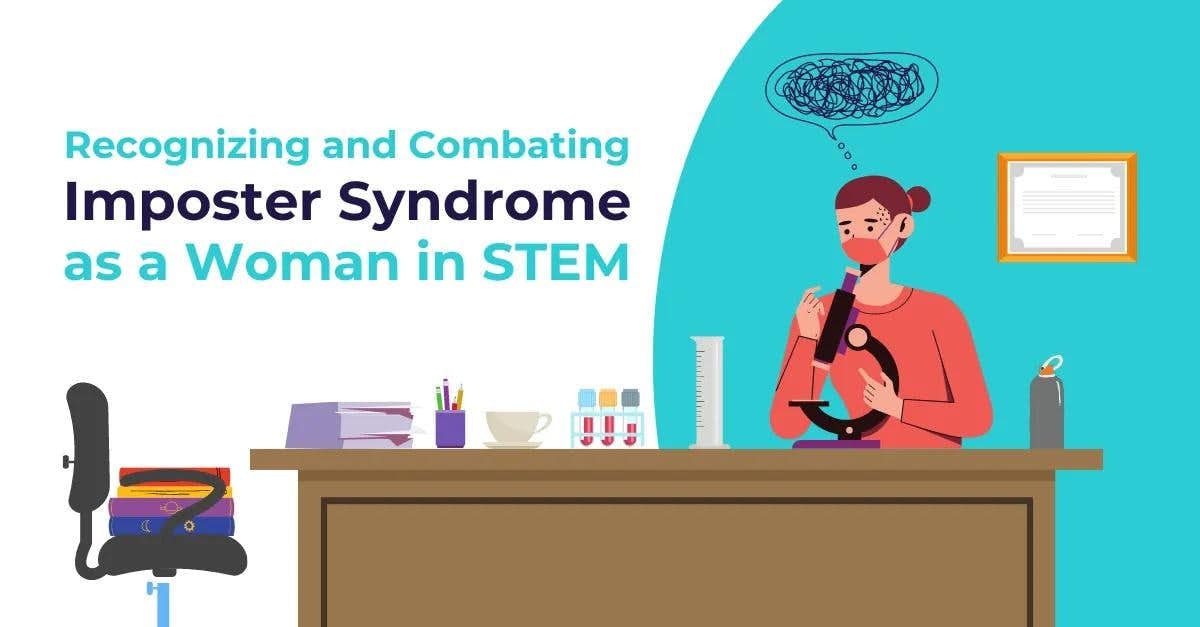August 26th, 2022

The persistent inability to believe that one's success is deserved or has been legitimately achieved as a result of one's own efforts or skills.
Imposter syndrome is the belief that, despite one’s successes and qualifications, their achievements are menial and they are undeserving or unqualified for a position in which they hold. This person may fear that at any moment they will be “found out” or “exposed.” In an effort to keep from being embarrassed by this faulty cognitive thinking style, they engage in self-defeating behaviors such as striving for perfection or having poor boundaries in an attempt to please and qualify for the role in which they already behold.

For women in STEM positions specifically, this can show up in several other ways.
First, it is important to note that many STEM positions are male-dominated, and entering a space as a minority can be very challenging. Braving through gender gaps and obstacles can impact the self-esteem of some women who work closely with their male counterparts.
For some women, they may have colleagues who aren’t aware of biases and perpetuate gender roles in the workplace, may not be respectful, and may look down on women who are in certain fields due to gender alone. Women in turn may develop insecurities about their belonging and sense of deservingness in their roles and the workplace.
To combat these uneasy feelings, some turn inward and begin to engage in unhealthy behaviors such as trying to model perfection. This means they may work longer hours to prove themselves even when it means taking work home. They may say yes more frequently to assignments when they really wanted to say no. They may seek new opportunities to learn more and become overachievers. They will self-doubt and frequently question themselves lacking the ability to account for their accolades. They may set unrealistic or very high achieving goals and feel disappointed if they fall short.

Imposter syndrome is a byproduct of faulty cognitive thinking styles. It is the result of a thinking pattern that is negative and directly impacts the view in which a person may have of themselves or the world around them. To further understand how imposter syndrome can manifest take notice if you have experienced any of the following:

To combat these faulty thinking styles, it is imperative that you begin to acknowledge when they are occurring. Having an awareness of your thoughts can help you to then begin to challenge them as they come up. Identify if you are feeling as though you have to be perfect and let go of the expectation.
Allow yourself some grace to learn from errors and be gentle with yourself. Remember that you have earned your place and are qualified. The qualifications for degrees and certificates took effort, time, commitment, and dedication. If you show up to work with maximum effort to fulfill your job duties, it is safe to say you more than belong there and have earned your place.
Be kind to yourself, be loving in your thoughts, and if all else fails ask yourself if you would say that to a friend.
Written by: Samantha Adjekum, LCPC.
At Clarity Clinic, we have highly trained staff who specialize in therapy and psychiatry services. To learn more about how we can support your mental health, call Clarity Clinic on (312) 815-9660 or schedule an appointment today.
Our Services
Virtual/Online CarePHP and IOPAdult PsychiatryChild & Adolescent PsychiatryAdult TherapyChild & Adolescent TherapyCouples CounselingFamily TherapyGroup TherapyPsychological TestingTranscranial Magnetic Stimulation (TMS)